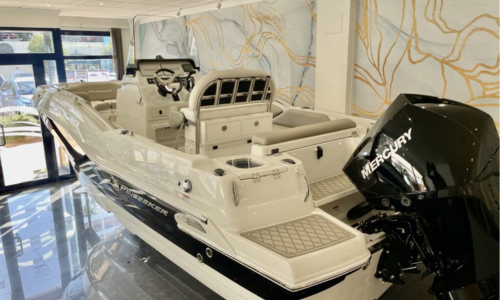How to choose the perfect boat?
Elegir el barco perfecto puede ser emocionante pero también desafiante, especialmente considerando la amplia variedad de opciones disponibles en el mercado. Para ayudarte en este proceso, aquí te presento algunos consejos sobre cómo elegir el barco perfecto.
Define your needs.
Before you start your search, it is important to be clear about what you will be using the boat for: fishing, water sports, family outings or longer trips? Identifying your needs will help you focus your search and select the right type of boat.
If you’re interested in fishing, consider a boat with specific features such as storage space for tackle, a fishing platform and specialised equipment. For water sports, look for a boat with a ski tower, swimming platform and capacity to carry the necessary equipment. If you prefer family cruising, a boat with ample space for passengers, seating areas and additional amenities such as a galley and bathroom may be ideal. For longer trips, consider larger boats with accommodation capacity and advanced navigation systems.
Consider size and capacity.
Determine the size of boat you need based on the number of people who will be using it regularly and the type of activities you will be doing. If you plan to take your family and friends, you will need a larger boat with enough room for everyone.
It is important to consider not only the number of seats available, but also the space to move comfortably on board. If you plan to spend nights on board, check that the ship has sufficient accommodation and amenities for all passengers. Also consider storage requirements for equipment, food and other items you may need during your outings.
Establish a budget.
Define your budget range before you start your search. Consider not only the initial cost of the boat, but also additional costs such as maintenance, fuel, mooring, insurance and possible repairs. Make sure the price of the boat fits your overall budget.
Remember that the cost of a boat is not just limited to the initial purchase. You should also consider ongoing expenses such as regular maintenance, insurance, taxes and fuel. If you opt for a used boat, it is important to factor in possible repair and refurbishment costs. Carefully evaluate your budget to make sure you can cover all these expenses without compromising your personal finances.
Research and compare.
Research different makes, models and types of boats. Read reviews, check out opinions from other owners and compare the features and specifications of each option. This will help you get a clear idea of the advantages and disadvantages of each boat and allow you to make an informed decision.
Visit boat shows, boat shows or contact dealers and manufacturers to get detailed information about the boats you are interested in. Take advantage of these opportunities to see boats in person, ask questions and compare different models. You can also search online for additional information and expert opinions.
Consider the browsing experience.
If you are an experienced sailor, you may want a more sophisticated, higher performance boat. These boats tend to be faster, have advanced navigation systems and offer a greater degree of customisation. However, if you are a beginner, it is advisable to opt for a boat that is easier to handle and suits your level of experience.
If you have no previous sailing experience, consider taking sailing courses or requesting the assistance of an experienced instructor or skipper at the beginning. This will help you become familiar with boat handling and sailing rules, ensuring a safe and enjoyable experience on the water.
Examine the status and quality.
If you are considering buying a used boat, thoroughly inspect the overall condition of the boat. Check the maintenance carried out, the condition of the engine, the structure and the quality of the materials used. If possible, take a test sail to make sure everything is in good working order.
If you do not have experience in evaluating boats, consider hiring a professional marine surveyor to conduct a thorough inspection. The surveyor will examine the boat’s structure, systems, engine and other components to identify potential problems or areas that need attention. This initial investment can save you future problems and costs.
Consult experts.
If you have questions or need additional advice, don’t hesitate to turn to boating experts or professionals in the boating industry. They will be able to provide you with valuable information and guidance based on their experience and knowledge.
Contact boat dealers and boat manufacturers for personalised advice. Explain your needs and expectations, and let them guide you to the options that are right for you. You can also seek help from experienced boaters or join online communities where you can share your concerns and get advice from experienced boaters.
Remember that choosing the perfect boat depends on your needs, preferences and budget. Take your time, do your research and don’t be afraid to ask questions. By following these tips, you’ll be well on your way to buying the perfect boat to enjoy your adventures on the water.
Other news that may interest you
- How to choose the right Crownline model for your lifestyle
- What to bear in mind when anchoring in Mediterranean coves?
- What makes Crownline a leader in recreational boating?
- Apps and technology that make sailing easier for beginners: Navigating has never been easier
- Tips for basic boat maintenance: Keep your boat ready to sail at all times

